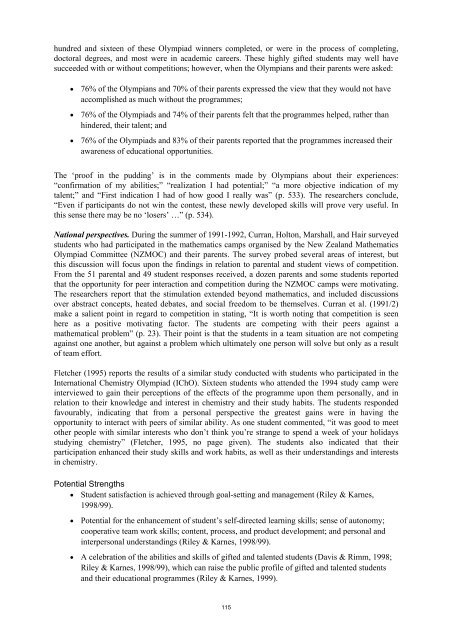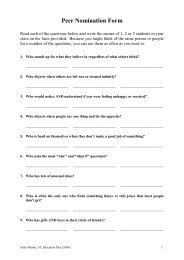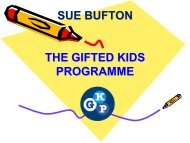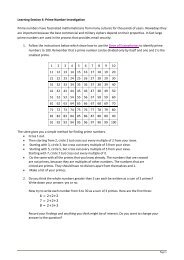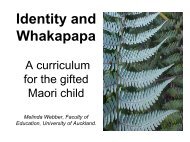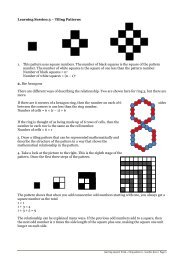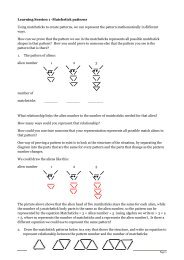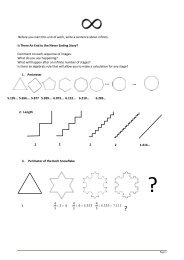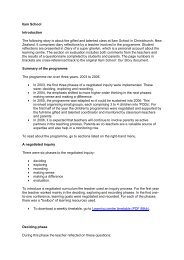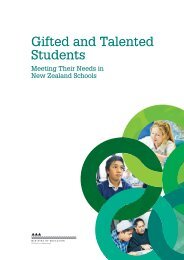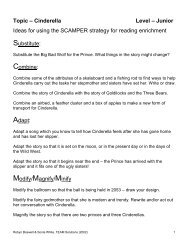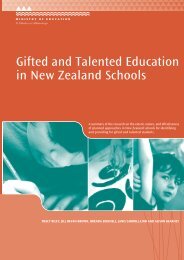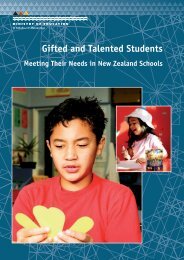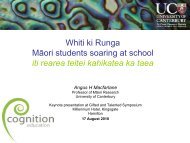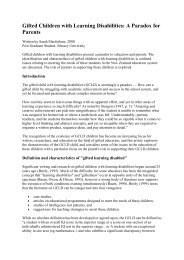The Extent, Nature and Effectiveness of Planned Approaches in ...
The Extent, Nature and Effectiveness of Planned Approaches in ...
The Extent, Nature and Effectiveness of Planned Approaches in ...
You also want an ePaper? Increase the reach of your titles
YUMPU automatically turns print PDFs into web optimized ePapers that Google loves.
hundred <strong>and</strong> sixteen <strong>of</strong> these Olympiad w<strong>in</strong>ners completed, or were <strong>in</strong> the process <strong>of</strong> complet<strong>in</strong>g,doctoral degrees, <strong>and</strong> most were <strong>in</strong> academic careers. <strong>The</strong>se highly gifted students may well havesucceeded with or without competitions; however, when the Olympians <strong>and</strong> their parents were asked:• 76% <strong>of</strong> the Olympians <strong>and</strong> 70% <strong>of</strong> their parents expressed the view that they would not haveaccomplished as much without the programmes;• 76% <strong>of</strong> the Olympiads <strong>and</strong> 74% <strong>of</strong> their parents felt that the programmes helped, rather thanh<strong>in</strong>dered, their talent; <strong>and</strong>• 76% <strong>of</strong> the Olympiads <strong>and</strong> 83% <strong>of</strong> their parents reported that the programmes <strong>in</strong>creased theirawareness <strong>of</strong> educational opportunities.<strong>The</strong> ‘pro<strong>of</strong> <strong>in</strong> the pudd<strong>in</strong>g’ is <strong>in</strong> the comments made by Olympians about their experiences:“confirmation <strong>of</strong> my abilities;” “realization I had potential;” “a more objective <strong>in</strong>dication <strong>of</strong> mytalent;” <strong>and</strong> “First <strong>in</strong>dication I had <strong>of</strong> how good I really was” (p. 533). <strong>The</strong> researchers conclude,“Even if participants do not w<strong>in</strong> the contest, these newly developed skills will prove very useful. Inthis sense there may be no ‘losers’ …” (p. 534).National perspectives. Dur<strong>in</strong>g the summer <strong>of</strong> 1991-1992, Curran, Holton, Marshall, <strong>and</strong> Hair surveyedstudents who had participated <strong>in</strong> the mathematics camps organised by the New Zeal<strong>and</strong> MathematicsOlympiad Committee (NZMOC) <strong>and</strong> their parents. <strong>The</strong> survey probed several areas <strong>of</strong> <strong>in</strong>terest, butthis discussion will focus upon the f<strong>in</strong>d<strong>in</strong>gs <strong>in</strong> relation to parental <strong>and</strong> student views <strong>of</strong> competition.From the 51 parental <strong>and</strong> 49 student responses received, a dozen parents <strong>and</strong> some students reportedthat the opportunity for peer <strong>in</strong>teraction <strong>and</strong> competition dur<strong>in</strong>g the NZMOC camps were motivat<strong>in</strong>g.<strong>The</strong> researchers report that the stimulation extended beyond mathematics, <strong>and</strong> <strong>in</strong>cluded discussionsover abstract concepts, heated debates, <strong>and</strong> social freedom to be themselves. Curran et al. (1991/2)make a salient po<strong>in</strong>t <strong>in</strong> regard to competition <strong>in</strong> stat<strong>in</strong>g, “It is worth not<strong>in</strong>g that competition is seenhere as a positive motivat<strong>in</strong>g factor. <strong>The</strong> students are compet<strong>in</strong>g with their peers aga<strong>in</strong>st amathematical problem” (p. 23). <strong>The</strong>ir po<strong>in</strong>t is that the students <strong>in</strong> a team situation are not compet<strong>in</strong>gaga<strong>in</strong>st one another, but aga<strong>in</strong>st a problem which ultimately one person will solve but only as a result<strong>of</strong> team effort.Fletcher (1995) reports the results <strong>of</strong> a similar study conducted with students who participated <strong>in</strong> theInternational Chemistry Olympiad (IChO). Sixteen students who attended the 1994 study camp were<strong>in</strong>terviewed to ga<strong>in</strong> their perceptions <strong>of</strong> the effects <strong>of</strong> the programme upon them personally, <strong>and</strong> <strong>in</strong>relation to their knowledge <strong>and</strong> <strong>in</strong>terest <strong>in</strong> chemistry <strong>and</strong> their study habits. <strong>The</strong> students respondedfavourably, <strong>in</strong>dicat<strong>in</strong>g that from a personal perspective the greatest ga<strong>in</strong>s were <strong>in</strong> hav<strong>in</strong>g theopportunity to <strong>in</strong>teract with peers <strong>of</strong> similar ability. As one student commented, “it was good to meetother people with similar <strong>in</strong>terests who don’t th<strong>in</strong>k you’re strange to spend a week <strong>of</strong> your holidaysstudy<strong>in</strong>g chemistry” (Fletcher, 1995, no page given). <strong>The</strong> students also <strong>in</strong>dicated that theirparticipation enhanced their study skills <strong>and</strong> work habits, as well as their underst<strong>and</strong><strong>in</strong>gs <strong>and</strong> <strong>in</strong>terests<strong>in</strong> chemistry.Potential Strengths• Student satisfaction is achieved through goal-sett<strong>in</strong>g <strong>and</strong> management (Riley & Karnes,1998/99).• Potential for the enhancement <strong>of</strong> student’s self-directed learn<strong>in</strong>g skills; sense <strong>of</strong> autonomy;cooperative team work skills; content, process, <strong>and</strong> product development; <strong>and</strong> personal <strong>and</strong><strong>in</strong>terpersonal underst<strong>and</strong><strong>in</strong>gs (Riley & Karnes, 1998/99).• A celebration <strong>of</strong> the abilities <strong>and</strong> skills <strong>of</strong> gifted <strong>and</strong> talented students (Davis & Rimm, 1998;Riley & Karnes, 1998/99), which can raise the public pr<strong>of</strong>ile <strong>of</strong> gifted <strong>and</strong> talented students<strong>and</strong> their educational programmes (Riley & Karnes, 1999).115


